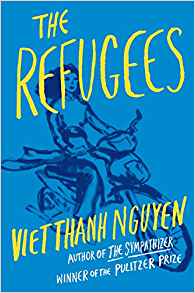 Viet Thanh Nguyen, The Refugees (New York: Grove Press, 2017), 209pp.
Viet Thanh Nguyen, The Refugees (New York: Grove Press, 2017), 209pp.
Viet Thanh Nguyen comes from a family of refugees. His parents were displaced twice, in 1954, and then again in 1975, when Viet came to America as a little boy after the fall of Saigon. His parents first settled in Pennsylvania, and later in San Jose, California, where they opened a grocery store (the setting for one of his stories).
Seven years after landing in America, his older brother Tung matriculated at Harvard, while Viet would complete two degrees at Berkeley (PhD in 1997). His wife and fellow writer Lan Duong is also a refugee. Today Nguyen is the Aerol Arnold Professor of English and American Studies and Ethnicity at the University of Southern California.
Nguyen's debut novel, The Sympathizer, won numerous awards, including the 2016 Pulitzer Prize for fiction, and made at least 30 "book of the year" lists. In March 2016, he followed up that novel with a work of non-fiction called Nothing Ever Dies: Vietnam and the Memory of War (Harvard University Press). His website calls the book "the critical bookend to a creative project whose fictional bookend was The Sympathizer." According to Nguyen, Nothing Ever Dies "examines how the so-called Vietnam War has been remembered by many countries and people, from the US to Vietnam, Laos, Cambodia, and South Korea."
The eight short stories in this collection were written across twenty years, and presumably before his novel. Refugees live hyphenated lives between two worlds, between past and present, the old country that you left and the new country where you live, between your mother tongue and your adopted language, between remembering and forgetting, between assimilating and conforming or living on the periphery of a new culture. Refugees are third culture people who can be obsessed with identity. They are in the throes of culture shock about language, food, the landscape, and "even the quality of light" in a new country (32). One thing is for sure, Nguyen's son Ellison, mentioned in the afterword, will have a radically different experience of America than did his parents and grandparents.


